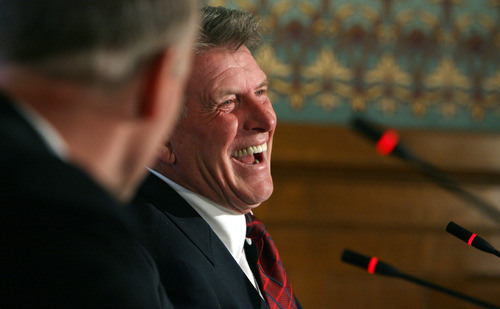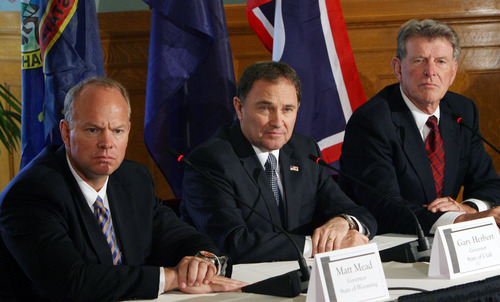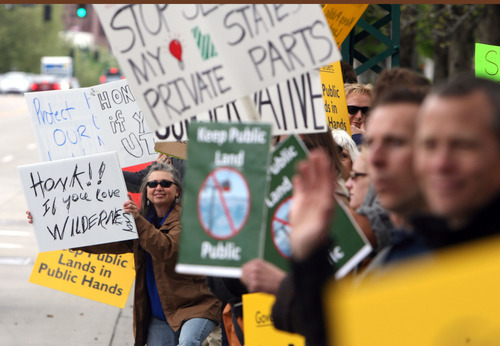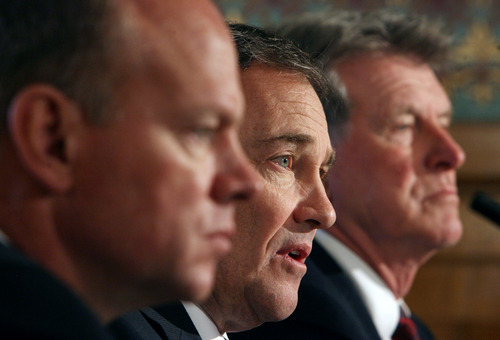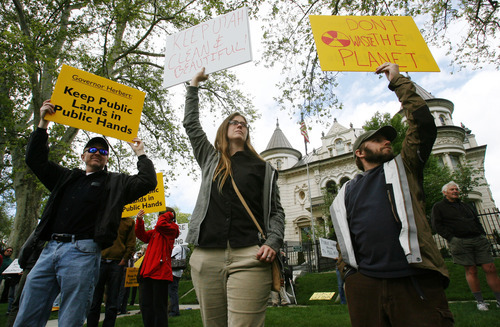This is an archived article that was published on sltrib.com in 2012, and information in the article may be outdated. It is provided only for personal research purposes and may not be reprinted.
The governors of Utah, Idaho and Wyoming met Friday in Salt Lake City to discuss public lands, energy, water and other key issues and agreed that, if they hope to influence national policy on those issues, they and their colleagues in the region must speak with a unified voice.
"We have the opportunity to drive the agenda on those things that are important to our states," said Wyoming Gov. Matt Mead, and the best way to do that is to find common interests. "We want to have the Western states, Democrats and Republicans alike, to have as strong a voice in this country as possible."
The governors — all Republicans — did not drill down into specific issues during the five-hour get-together, organized by Gov. Gary Herbert. But Idaho Gov. Butch Otter said the Rocky Mountain Roundtable serves as a "touchstone" to help build collaboration among the executives in the future.
Nevada Gov. Brian Sandoval also participated by phone. Colorado Gov. John Hickenlooper, a Democrat, was scheduled to participate by phone, but canceled due to legislative issues.
"We think the federal government would do better to watch and learn from what is happening in the states," Herbert said. "This is not an end result. This is really a beginning, a desire to communicate better with governors and learn from each other and our successes and our failures."
Outside the Governor's Mansion, about 80 protesters gathered, carrying signs opposing HB148, a bill signed last month by Herbert that demands Congress turn over nearly 30 million acres of federal land within Utah's borders.
Heidi McIntosh, an attorney with the Southern Utah Wilderness Alliance, which organized the protest, said there is long-standing frustration that Herbert wasn't listening to concerns about his environmental agenda. When he signed HB148, she said, "that was just a bridge too far."
"What we wanted to accomplish today was send this message that, with such an aggressive attack on Utah's wildlands, we're putting our future at risk, not only environmentally, but economically," she said.
SUWA supports a proposal to protect more than 9 million acres as wilderness in the state.
The other governors were noncommittal on whether they would support bills similar to HB148, which even Utah legislative attorneys said likely wouldn't survive a legal challenge.
Otter said he would have to see what the costs and benefits of such an approach would be, but he is sympathetic to the cause because, he said, the federal government owes it to Western states to relinquish lands, just as it has in states east of the Rocky Mountains.
"At a minimum, I think all Western [states] need to at least press the issue," Otter said. "I think we have an obligation to demand" the issue be addressed.
Mead, a former U.S. Attorney for Wyoming, said he would have to learn more about what such legislation would mean for national parks and forests, mineral rights and tourism in the state.
Earlier this week, U.S. Interior Secretary Ken Salazar blasted the Utah legislation as a counterproductive political stunt.
"From my point of view, it defies common sense," he said Tuesday in an interview with The Tribune.
"I think it is political rhetoric you see in an election year. The fact is, Utah is a great example of where, through the use of public lands, we are creating thousands and thousands of jobs."
Herbert said that there is a misperception that under the state plan the land would be sold to private interests. In reality, it would likely only be leased to them.
"The legislation is not conducive for us to sell [the land] off. I know there's that accusation, but that's a lot more political rhetoric than reality," Herbert said. "We all know there are beautiful pristine areas that ought to be preserved and protected. We also know there are areas that ought to be developed."
Twitter: @RobertGehrke


